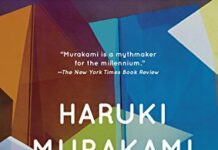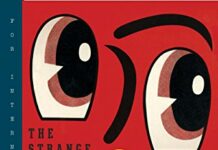
Ebook Info
- Published: 2015
- Number of pages: 246 pages
- Format: EPUB
- File Size: 0.18 MB
- Authors: Haruki Murakami
Description
NATIONAL BESTSELLERWind/Pinball, a unique two-in-one volume, includes, on one side, Murakami’s first novel Hear the Wind Sing. When you flip the book over, you can read his second novel, Pinball, 1973. Each book has its own stunning cover.In the spring of 1978, a young Haruki Murakami sat down at his kitchen table and began to write. The result: two remarkable short novels—Hear the Wind Sing and Pinball, 1973—that launched the career of one of the most acclaimed authors of our time. These powerful, at times surreal, works about two young men coming of age—the unnamed narrator and his friend the Rat—are stories of loneliness, obsession, and eroticism. They bear all the hallmarks of Murakami’s later books, and form the first two-thirds, with A Wild Sheep Chase, of the trilogy of the Rat. Widely available in English for the first time ever, newly translated, and featuring a new introduction by Murakami himself, Wind/Pinball gives us a fascinating insight into a great writer’s beginnings.
User’s Reviews
Reviews from Amazon users which were colected at the time this book was published on the website:
⭐Having read most of Murakami’s books and encountered the Rat in another book. I decided to read this duet of novellas. I read Hear the Wind Sing in one sitting since it’s 100 pages are really more like 50 pages single spaced. For those who have not read this book, this is a good introduction to his writing but not as polished and free flowing as his later novels. But because it is short it does not require the commitment needed to read examples such as 1Q84, Killing Commendatore, or The Wind Up Bird Chronicle, but which offer bigger rewards in the end In his characteristic surrealistic style this book traverses a short time of the main character’s life in Tokyo along with his friend the Rat, and an unnamed girlfriend, along with passages of autobiographical moments recollected by the main character. I guess I read it looking for a plot line but it somewhat meanders with the only theme that I could find was life and death. He does a decent job finding a way to end the novella. As an alternative to this I recommend some of his other shorter books such as Norwegian Wood, Kafka on the Shore and Wild Sheep Chase along with his earlier mentioned longer novels where he had time to develop a better plot line and characters. A good novella never the less!
⭐These two early Murakami books will not be for everyone but I found them interesting – at least as a way of seeing how young men who would now be retired worked through the changes of the late 60s early 70’s. Of course there is an air of unreality/fantasy mixed with the mundane but that adds to the interest. Otherwise they would be seriously dull novels. How many beers drunk and cigarettes smoked could you stand? I look forward to reading some later Murakami but found these short novels a pleasant intro.
⭐Bottom Line First:I have to agree that this two book special is going to hold the most interest for a reader who already likes later works by Murakami. I also second those reviewers who suggest that the best parts of this two for one book is Murakami telling how he came to be a writer. That I am among that group may be the only reason why I have posted four stars. These are the first books by this author, they have not been published in English before and this edition may be the only way to get them. Properly novellas, Pinball, 1973 is 123 pages And Hear the Wind Song is 101. If you are the kind of reader who likes to start at the beginning with a writer you will not regret starting with this author. Pinball, 1973 and Hear the WindSing introduce us to the unnamed narrator, his drinking buddy and sometime philosopher. I found them somewhat interesting. The two story lines are weak but there are flashes of good writing. I promise that Murakami gets better.Pinball will take us through the back story of an unnamed narrator/character. He is somewhat aimless but at least a capable translator. His luck with women is wildly uneven entirely credible and not entirely complementary towards women. One girl friend has left him via a suicide before the beginning of the book and he spends most of the book living with twins who names he never learns. They cater this animal needs, cooking and bedroom and never seem all that critical to the story. They seem to prefer being nameless and are in not in any kind of thrall to his power or worldliness. They are not exactly powerless victims of their man, but neither are they given any depth of personality.The Rat is one of two mentors to the narrator. He is apparently of independent means, something of a radical, and sometime center of the narrative. He also has a love life but seems unable to connect his happiness with her as something worth working to keep. The other major characters include J the local Chinese bartender and the people who work with the Narrator in his Translator shop. The Woman who works as the main secretarial staff between the Narrator and his partner seems to be the one person who cares about him and he never seems to notice.The two stories do not have a much plotting. There is a great deal about Pinball machines a topic Murakami eventually drops and a great deal about mostly American pop music and European classical music. These are topics that will reappear in every other Murakami book.If this sounds less than enthusiastic. That is how I felt at the end of the two stories. There are some wonderful moments. I enjoyed the flashes of how the author will develop. The books combine into a series of small more or less connected events and images that kept me reading.
⭐I ABSOLUTELY LOVE THIS AUTHOR!!!!! He is AMAZING!!!!! With each of his novels you are “right there”!!!! He will keep you wanting MORE!!!!!!
⭐If you’re a Murakami completist this is an absolute must. In the early 1970s Murakami released these two short novels in Japan, but they didn’t see a wider release. Here they’re combined into a single volume, “Hear The Wind Sing” on one side, and “Pinball, 1973” on the other. Each is a mere 160 or so pages long, and they’re quick reads, but are they any good?I’ve owned a copy of “Hear The Wind Sing” for many years, a tiny paperback published by the Kodansha English Library, and when I first read it I wasn’t that impressed. It was clearly a very early work by Murakami, and there didn’t seem to be much in the way of a plot. The same was true of “Pinball, 1973”, a copy of which came into my hands some time later, but both feature the character known as The Rat, who also appears in “A Wild Sheep Chase”. Reading the books again now in this hardback edition they’re still not great, and if you’re new to Murakami I urge you to start elsewhere. If you’re a collector of the man’s work you’ll want a copy of this on your shelf for completeness sake, plus the covers are nice, but as stories they’re not really very good at all in my opinion, and far from his best work.
⭐Hear the Wind Sing and Pinball are English translations of Haruki Murakami’s first two novels which were published together in a one volume edition in 2015. In a forward to this volume the author gives an overview of how he started writing. I found this very interesting and could relate some of his experiences to similar ones of my own, though mine were not related to writing fiction.One practice Murakami described which I thought a fascinating idea was his writing a first draft in English, a language foreign to him, and then translating it into his native Japanese. His logic for doing this was that he would be writing with a limited vocabulary so that when he translated his words back into Japanese the resultant text would be free of any extraneous detours or embellishments that one might be prone to include when writing in one’s own language. He claimed this practice helped him develop his precise style of writing.These two books work well together with Pinball being a sequel to Hear the Wind Sing.Taking the two books as one entity the common theme is growing up, moving on, and the temporary nature of our world, the relationships, places and situations. There are two main characters who spend much time together drinking and smoking. One heads off to college and the other stays in the home town. The novels follow the life, thoughts, feelings and experiences of both.I found the way characters in the story related to one another quite emotionless in many cases. There was an almost stoic, if not totally unemotional, acceptance of change and a reluctance, or should I say, no tendency, to become close to people, even people with whom one is spending a lot of time, even in very intimate circumstances. I find this different from my own environment, but perhaps it is a trait found in societies with a greater population density and level of mobility than one finds where I live.These early works of Murakami’s contain many of the topics, themes and attributes found in his later stories. To name just a few one finds, wells, cats, and Japanese everyday life. The only straying into the surreal that I can recall from these two books was a reference to the perception one character had, while a passenger in a car, of the three dimensional world fading into a two dimensional world and back again. This is an illusion I have experienced myself and I believe is more to do with one’s level of tiredness rather than any dimensional shift.I enjoyed reading these books and would recommend them to other Murakami fans, not that such a recommendation is necessary. Would I recommend them to someone who is not familiar with this author’s works? I don’t know. I like his style and his writing carries me along at a steady pace and I can relate to his digressions and detours while getting the overall sense of his message. The books are short so do not require much time commitment, but not a lot happens in them and someone new to Murakami may not be encouraged to read more of his novels on the basis of reading these two. Having said that, Hear the Wind Sing, won Murakami his first writing competition and it was his winning this competition that spurred him on to continue writing. For that, I am glad he won.
⭐Within Murakami’s first foray into our minds ‘we hear the wind sing’ the oft heard existential ballad of life’s journey from cocooned childhood to the stark reality of adulthood. For his first novel he provides a template for his future writing. He is an author that you either “get” or don’t connect with. The ultimate marmite conundrum! From the moment Norwegian Wood found me, not I it, his stories have entranced me. Like many others his words speak to me on a very personal and almost cosmic level. Some sentences or happenings echo or mirror events or thoughts I once had. And therein lies his genius. Once he finds you it will all make sense. I write this as I have finished the first part of this double edition. I have heard the wind. A pre Christmas snow is beginning to fall heavily outside. A cat in our back garden is unsure of what’s falling from the sky. Now Im ready for some pinball.
⭐Like Philippe Djian did after him; a writer of American tales written outside of America set in a different country like a 53rd or 54th state as yet unnamed. This is not the full Murakami yet but all the trademark moves are already present: oneiric people and places; jumps in time; a queer relationship to the feminine; Western European and American food totally obliterating any idea one might be in Japan; a sort of Elvis Presleying paint-roller applied to everything…And tangentially glimpses of something Nipponese; but only spotted through the slats of the tales … if you look intently.Not his best of course … he did them as he felt he should; having had a satori telling he was to be a writer whilst sitting at a baseball game [recounted in foreword] … but it is Murakami ; a fourth-dimension writer of genius like Thomas Pynchon or Roberto BolañoSo not his best is still better than most .. all fans a must … others … go on then
⭐Wind – I LOVE the Rat in this story; every time he’s mentioned, you know some great dialogue is about to happen. Otherwise a lovely read about love and life. It’s really nice to read about the origins of the narrator, the Rat and J.Pinball – things take a more bizarre and reflective approach in this story, though it’s amazing how Pinball is included in this book (especially the reunion near the end – absolute comic genius).My only issue is that I feel like some really important pieces of the puzzle have not been mentioned to set you up for The wild sheep chase. I still have many questions and whether this was intended or not I don’t know, but I feel like calling Murakami and asking a load of who’s and why’s XDOverall two really smooth and entertaining reads that give you a nice insight on the Murakami origins as well as the Sheep Chase characters.
Keywords
Free Download Wind/Pinball: Two novels in EPUB format
Wind/Pinball: Two novels EPUB Free Download
Download Wind/Pinball: Two novels 2015 EPUB Free
Wind/Pinball: Two novels 2015 EPUB Free Download
Download Wind/Pinball: Two novels EPUB
Free Download Ebook Wind/Pinball: Two novels





